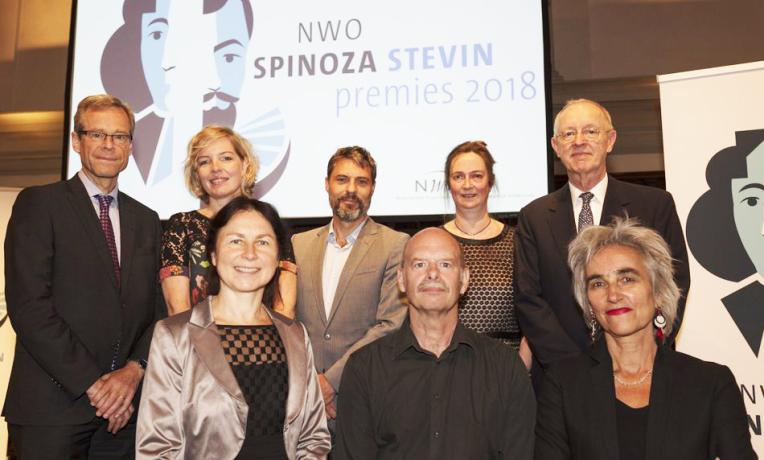
The prizes honour the researchers' outstanding, pioneering and inspiring work. The key focus of both prizes is the quality of the researcher. While the Spinoza Prize emphasises scientific work and fundamental questions, the Stevin Prize primarily honours social impact.
Anna Akhmanova, professor of Cellular Dynamics at Utrecht University, is a leading expert in the field of cell biology of the cytoskeleton and a pioneer in the use of the latest techniques in cell biology. Professor Akhmanova has made a number of ground-breaking discoveries that reveal exactly what the cytoskeleton’s function is and which mechanisms underlie these functions.
Marileen Dogterom is one of the most important figures of biophysics in the Netherlands. She became world famous for her experimental research on the forces generated by the cytoskeleton. Dogterom was the first to measure the forces generated by the microscopic tubules of the cytoskeleton during cell division. She is professor of Bionanoscience at TU Delft and the driving force behind the national consortium BaSyc ("Building a Synthetic Cell").
In 2014, Marileen Dogterom and Anna Akhmanova, were jointly awarded an ERC Synergy Grant for their pioneering project "ModelCell".
Carsten de Dreu is professor of Social and Organisational Psychology at Leiden University. He conducts ground-breaking research on conflicts, negotiation processes, decision-making and creativity in small groups. Professor de Dreu has made important contributions to studies on the neurological processes governing group conflict. For example, he has demonstrated that poor decision-making and groupthink does not only come about as a result of cognitive shortcomings. Carsten de Dreu was awarded an ERC Advanced Grant in 2018.
Beatrice de Graaf is professor of History of International Relations and Global Governance at Utrecht University. In addition to conducting high-level historical research, she is also considered a scholar that knows how to bring together science, politics, practice and society. Professor de Graaf is capable of translating highly abstract concepts into practical discussions without losing sight of the scientific nuance. She is in high demand as a terrorism expert and advises various public and private organisations in the Netherlands and abroad.She was awarded an ERC Consolidator Grant in 2014 for her project "Securing Europe, Fighting its Enemies: The making of a security culture in Europe and beyond, 1815-1914" (SECURE).
Other laureates were Professor John van der Oost from Wageningen University (Spinoza Prize) and Professor Marion Koopmans from Erasmus MC in Rotterdam (Stevin Prize). More about the Prizes.
The European Research Council, set up by the European Union in 2007, is the premiere European funding organisation for excellent frontier research. Every year, it selects and funds the very best, creative researchers of any nationality and age, to run projects based in Europe.
To date, the ERC has funded over 8,000 top researchers at various stages of their careers. It offers four core grant schemes: Starting, Consolidator, Advanced and Synergy Grants. The ERC strives to attract top researchers from anywhere in the world to come to Europe.
The ERC is led by an independent governing body, the Scientific Council. The ERC President is Professor Jean-Pierre Bourguignon. The ERC has a budget of over €13 billion for the years 2014 to 2020 and is part of the EU research and innovation programme, Horizon 2020, for which European Commissioner for Research, Innovation and Science Carlos Moedas is responsible.

